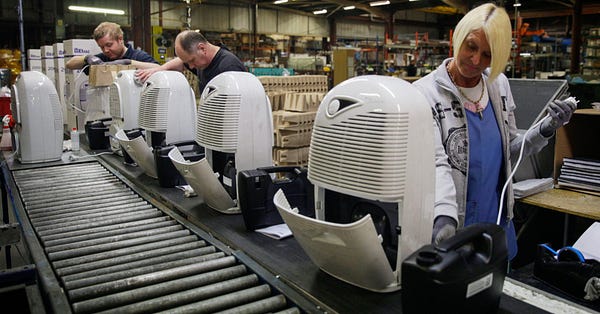Themes to watch in 2023...
Struggling local businesses + mortgages + Noma closing + electric cars + SBF
Hello and welcome to Off to Lunch. In this edition I want to look at some key themes that I am tracking in the early days of 2023. Usually Friday’s edition is only available in full for paying members, but today it is free for everyone…
Local businesses closing due to rising costs
I have said “local” here because a single shop or pub can demonstrate the pressure on businesses right now more vividly than a national chain. However, the same principles apply. Rising energy bills and costs will really squeeze businesses this year. In my podcast interview with Archie Norman, the Marks & Spencer chairman said that 2023 would be the year that businesses felt the hit from higher energy costs because many had hedged their bills for 2022 in advance and so were yet to feel the impact.
Pubs and breweries seem to be particularly feeling the pressure. Here are a few examples:




According to a survey by the Federation of Small Businesses, which was published earlier this week, almost one in four small businesses are at risk of closing or having to restructure or downsize once the government cuts support on energy bills in March…


A couple of big “what ifs” to finish here. What if consumer spending holds up better than expected? GDP figures out on Friday show that the UK economy grew by 0.1 per cent in November - much better than the 0.2 per cent contraction forecast by economists according to a Reuters poll. The economy was boosted by spending on food and drink during the World Cup. This means that the UK could avoid entering a recession, which is two consecutive quarters of decline, at least for now.
The next set of data on the UK economy will need to show that the economy contracted by 0.5 per cent in December for the UK to enter a recession, the Office for National Statistics said in its announcement. But the early trading updates from big retailers - such as Tesco, Sainsbury’s and Marks & Spencer - show strong sales in December as households tried to enjoy Christmas. When you consider that a key driver of the UK economy contracting by 0.6 per cent in September was the death of the Queen and the extra bank holiday, you can see that despite economists modelling the macro environment and wider trends, one-off social drivers are key drivers of spending.
The second big “what if” is this: what if inflation falls back faster than expected? In the US the consumer price index was up 6.5 per cent in December, data published on Thursday showed. That is the lowest level of inflation since October 2021 and much lower than the 10.7 per cent in the UK. Inflation of 6.5 per cent is still worryingly high and the Federal Reserve has been much more aggressive than the Bank of England in putting up interest rates, but it is a positive sign…
The consequences of higher mortgage rates
According to Moneyfacts the interest rate on an average two-year fixed mortgage across all loan-to-value ratios is 5.79 per cent. On a five-year deal it is 5.63 per cent. In January 2022 the two-year rate was 2.38 per cent and the five-year rate was 2.66 per cent. Needless to say, this dramatic change is going to have an impact on homeowners across the UK…


According to this Bloomberg piece by my former colleague Philip Aldrick, more than 1.4 million fixed-rate borrowers have to renew their mortgage in 2023 and more than half of those borrowers currently have deals with interest rates of less than 2 per cent. This is going to hurt. On average the households whose deals expire this year are facing a £250 increase in their monthly payments. Furthermore, The Financial Times reported earlier this week on a report from Oxford Economics and Hargreaves Lansdown that it is younger borrowers who are likely to be squeezed the most because they stretched themselves to buy a property when house prices were high. Piece here.
The Financial Conduct Authority has said that roughly 200,000 households had already fallen behind on their repayments by the middle of last year and another 570,000 are at risk because their monthly mortgage mortgages are more than 30 per cent of their income. This warning made the front page splash of The Daily Telegraph on Thursday, which you can read here. New data from Nationwide also says that mortgage payments as a proportion of someone’s take-home pay are the highest since 2008. For first-time buyers it was 39 per cent in the final quarter of 2022. Story here.
You get the idea here, I could go on…
The wider consequences of the end of easy money
Higher interest rates on loans is going to impact businesses as well as households. Businesses that are looking to grow fast but have yet to demonstrate they can generate a profit are going to find it harder to raise money, and the loans they can get hold of will come with a higher interest rate. This will change the direction of many industries - and therefore the financial markets. This could mean profitable incumbents face fewer challengers but also that businesses which are actually growing sales and profits are valued more highly on the stock market. I asked Ocado boss Tim Steiner about what the end of cheap money could mean in the grocery market in our podcast interview, given his company faces competition from rapid delivery firms. More on that here.
In this annual letter to investors, Terry Smith, the boss of Fundsmith, blamed his fund’s underperformance in 2022 (his Fundsmith Equity Fund lost 14 per cent of its value) on the end of “easy money” and the resulting hit to shares in technology companies. The manager of Baillie Gifford’s tech-focused Scottish Mortgage Investment Trust also said it had been a “humbling year”.

Changing working practices
There is going to be more news on the four-day working week, flexible hours and the home-versus-office debate in 2023. Here are two examples already. City AM, the free business publication, is scrapping its Friday newspaper and will be digital-only on that day…


And Microsoft is to give its staff in the US unlimited leave by offering “discretionary” days off alongside their existing corporate holidays…


On a similar note, the announcement that Noma, the renowned Copenhagen restaurant, is going to close is a fascinating story. Noma has regularly been named the best restaurant in the world. However René Redzepi, the chef behind Noma, told The New York Times:
“We have to completely rethink the industry. This is simply too hard, and we have to work in a different way.”
Noma will instead become a food laboratory developing new dishes to sell online. It will also occasionally open pop-up restaurants…


On the other side of this debate, lots of big companies are trying to get staff back to the office more…


Pay, strikes and the battle to retain staff
This theme brings many of the stories above together. The public sector is suffering from widespread strikes. Trains, healthcare and other services have all been disrupted as trade unions push for pay rises inline with inflation. But this is an issue for the private sector too. If businesses are not suffering from strikes, then they face a battle to find and retain staff, who want better pay and more flexible working.
In Japan the owner of Uniqlo, Fast Retailing, one of the biggest retailers in the world, said this week that it would increase pay by up to 40 per cent for staff. The Japanese prime minister has called on businesses there to help employees with rising prices or the economy will suffer from stagflation. Full story here. Although the issues and political environment is different in Japan (Andrew Bailey, the governor of the Bank of England, caused controversy last year when he said workers in the UK should not ask for big pay rises because it will engrain inflation), this shows how political pressure could eventually come to bear on businesses.
Deals and new investment
Despite the economic slowdown, interesting deals are still happening. Indeed, the economic slowdown will spark some deals, with market leaders looking to snap up bargains and consolidate, or new entrants making a splash.
This week there has been a big deal announced in the PR world, with Teneo agreeing to buy Tulchan for around £65 million. Meanwhile, Microsoft is in talks to invest $10 billion into OpenAI, the owner of ChatGPT, the AI/chatbot technology that has caused such a stir in recent weeks (see Off to Lunch from December 12 for more). Talking of ChatGPT, its arrival means the progress of AI technology will be more in focus than ever this year. For example, this piece looks at what it could mean for the media. In short, it’s great for original reporting and finding out things that others don’t know.
Electric cars at vital junction
Britishvolt, the company behind a gigafactory project in Blyth, Northumberland, is hunting for new investment to take its plan forward. Britishvolt’s proposals would mean a factory is built in the UK that can produce electric car batteries on a grand scale. That is pivotal for the future of the car industry in the UK. But it is not the only reason why electric cars should be tracked closely in 2023. Another interesting business to watch is Oxbotica, a University of Oxford spin-out that has just raised another $140 million to develop its software that allows vehicles to be autonomous. Its backers include Tencent, BP, Ocado and IP Group.
The consumer-side of electric cars is perhaps even more important. As this Times article touches on, manufacturers are wary about stepping up production of electric vehicles because the demand just isn’t there from consumers. This LinkedIn post by BNP Paribas’s Charles Clarke is a great example of the challenges facing motorists who chose an electric car - they are struggling to find working charging points and when they do they are more expensive than filling up a car with petrol. We have touched on these issues in Off to Lunch before (check out this from June 2022). In short, the infrastructure for electric cars in the UK - particularly charging points - needs to get better, and quickly…
On this theme, Tesla has just cut its prices by up to 20 per cent as it looks to boost demand…
Sam Bankman-Fried, FTX and crypto…
A trial looms in October for Sam Bankman-Fried. A Michael Lewis book is also on the way. This story isn’t going anywhere. Neither is the debate about the future of cryptocurrencies. For more on this, let me hand over to the man himself. Bankman-Fried started his own Substack on Thursday, using his first post to try to explain how FTX collapsed and why he is innocent…
You should also read this…
The superb David Epstein is now publishing his Range Widely newsletter on Substack. I recommend this piece from last week about sudden cardiac deaths in athletes after the Buffalo Bills’ Damar Hamlin collapsed during a game. It’s a personal piece full of important information. Thankfully, Hamlin has now been discharged from hospital (Range Widely)
Another new Substack writer to check out is Annie Duke, the former poker player. Ed Smith referenced Duke’s work on decision-making in our podcast on England cricket (Thinking in Bets)
I was living in Liverpool when the Liverpool One retail development opened and subsequently wrote about its owner - Grosvenor - when I covered the property industry for The Daily Telegraph. So I was fascinated by this piece on the impact of Liverpool One on the city as it celebrates its 15th birthday. A clear example of how investment and businesses can transform a city (The Post)
I am a bit late to this one, so apologies, but it’s always worth checking out Bill Gates’s annual book recommendations at the end of a year. This time he did something slightly different and picked out five of his all-time favourite books (GatesNotes)
The coach of the United States during the World Cup in Qatar, Gregg Berhalter, has become embroiled in an extraordinary blackmail controversy involving one of his star players Gio Reyna and his parents. In this Harvard Business Review interview he talks about that and leading a team in the World Cup (Harvard Business Review)
Ambitious plans to redevelop the Howells building in Cardiff have been revealed, including an eye-catching roof terrace (BusinessLive)
For those who are interested, the full attendee list for the World Economic Forum in Davos - which takes place next week - has been published online (The Dossier)
An interview with Warren Buffett from 1979 has been unearthed in which he provides details about his investment approach (Neckar’s Minds and Markets)
The Ultimate rollercoaster at Lightwater Valley, a classic part of many Northern childhoods in the 1990s and 2000s, is to be demolished as the theme park tries to refocus on attracting younger children and families (The Yorkshire Post)
And finally…
I have written plenty about what to read, so how about finishing with things to watch. The BBC showed many of Pixar’s films over Christmas and I got to see Coco, Inside Out and Soul again. These three films are more for adults than children and would all make my list of greatest-ever films. Genius.
The return of Happy Valley is a reason to re-watch the first two series or watch them for the first time if you haven’t already. A different kind of brilliance from creator Sally Wainwright and stars Sarah Lancashire and James Norton….
Thanks for reading. If you enjoy Off to Lunch then please share it with others and spread the word. If this newsletter was shared with you then please sign-up below to become a member, get Off to Lunch sent directly to your inbox, attend our forthcoming events and contribute to the work of Off to Lunch
Best
Graham









